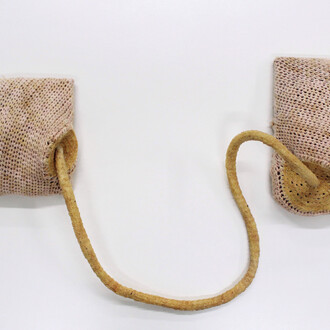I was often trying to define architecture as sculpting the void. Indeed, the material that makes architecture is penetrable empty space. You can appreciate it from inside. But emptiness in itself is not visible. Something must contain it. Architectural space is contained generally within a box. Architects' work is most often to conceive that box. Sculpting space can be achieved also by creating negative space, i.e. space around objects, that means space like a "mold" of those objects. That work also falls into the domain of architecture. Thus technique of architects produces the box as hardware, but architecture as art is the software, space within and around the box. The box itself is simply a special kind of ordinary sculpture, eventually enhanced through painting, for example murals. An exhibition of any kind refers to both techniques of the architect in supplement to the topic of the exhibition: the space. We call it installation, in common language.
(Yona Friedman)
The two shows presented at Massimo Minini and Francesca Minini's galleries represent a step ahead in the exploration of the complex work of Yona Friedman. Indeed, his work is transversal to many different fields from architecture to art, design, biology, philosophy, sociology, just to mention a few of them. The shows at the Minini’s galleries come from the project of his more recent book "Untitled", focused on his working material that can be seen as art.
Friedman wrote in the preface of the book: "I tried to sum up my extra-architectural explorations in several of my previous books. Some are about ecology, some about sociology, and one is even about dogs. This however is the first one about art. I am of the visual kind: an image explains, for me, many things. I am known, in my professional work, for my use of simple images, cartoons or pictograms to replace texts." Indeed, inside the complexity of the work of Yona Friedman it is important to understand that his visual production is part of a more general view and that he uses the pictures very often in visualizing his thinking. This means we do not have to consider his visual production as separated by the rest of his work as it is part of it. As Friedman in his introduction pointed out, very often the pictures replace texts. This means that the images in his work show us his mental processes that he doesn't formalise only in his text but either in his visual production. The fact that the complex figure of Yona Friedman has been recover to the public attention in the last 15 years by the international art world is due to the fact that his work of architect open to the exploration of other fields has finally appeared in all its complexity under the lens of art.
Some of the pictures presented in these two shows are partially from the two locations in which Friedman has developed his work: the former studio-apartment of the Boulevard Pasteur and his late apartment in the Boulevard Garibaldi, both in Paris. In these two exhibitions we would like to underline the visual process of the Friedman's thinking deployed in connections with his work about architecture. Starting from the title "Sculpting the Void. Une proposition de Yona Friedman et du Fonds de Dotation Denise et Yona Friedman”, these exhibitions would like to show a specific attention on the idea of community spanning from offering new models of architecture, that in recent years are focusing on shelters for migrants, in an engagement of rethinking our philosophy of life. Indeed, the rich work of Friedman is directed to rethink the relationship between the living beings and their environment, putting at the core of his radical thought his visual production.
Maurizio Bortolotti













